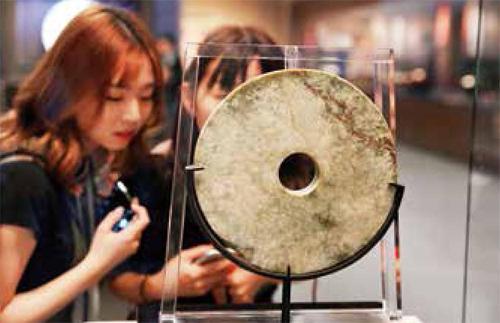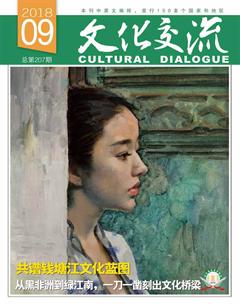一種歷史,一種情懷,一種精神
金丹丹
錢塘江,是浙江的母親河,浙江文明的搖籃。
用文化的眼光看錢塘江,它是一種歷史、一種情懷、一種精神、一種價值觀。
錢塘江文化該如何定義?它具有哪些內涵?在當下挖掘錢塘江文化,對浙江的發展又有什么樣的指導意義?
為此,筆者采訪了三位專家,談談他們心目中的錢塘江文化。
宋建武(中國人民大學教授、博士生導師):挖掘錢塘江文化對發展具有示范意義
在宋建武看來,錢塘江文化是把歷史、現代及未來融為一體的開放的文化。它傳承了中華民族的優秀文化內核,在浙江改革開放的過程中,又融入了新的內涵。
這些年,隨著浙江的發展,特別是在浙江民營經濟及產業發展新動能轉換過程中,錢塘江文化有了“創新、進取”的新內涵。
“同時,錢塘江文化還體現了浙江人‘務實、創新的特性。浙江人在與人合作時,愿意先伸出橄欖枝,表明自己合作的誠意,以及有著善于挖掘新事物發展的眼光和承擔創新代價的胸懷。”
宋建武將錢塘江文化的特質概括為“創新、誠信、務實、進取”。
“浙江能夠在很多方面引領我國的區域發展,錢塘江文化堪稱文化基礎。”宋建武認為,挖掘錢塘江文化內核,對于理解浙江這一新時期發展樣板具有很大的認識意義。“人民群眾的美好生活需要更深層次的審美要素,以錢塘江文化為代表的浙江文化的發展,如果能夠把文化與經濟、與社會生活有機地結合,將會對滿足人民群眾對美好生活的需要有非常大的示范意義。”
宋建武建議,要走出一條別具特色的錢塘江流域文化產業發展之路,可以用具象的符號來體現其欣賞性、借鑒性、實用性,將錢塘江文化變成可以具體利用、欣賞的產品和服務。
“以錢塘江文化為基礎,可以打造優質的旅游產品。”宋建武說,錢塘江兩岸人文薈萃,有很多文化歷史積淀、很多美好故事和傳說,近現代歷史上很多名人也在錢塘江兩岸成長,這些都是很好的旅游文化資源;而近年來在浙江這片熱土上成長起來的許多行業引領性企業,作為錢塘江文化的新要素,也可以成為產業旅游的目的地。
他還建議,將錢塘江流域歷史與當代名人,以作品為基礎,將之變成可復制的大眾文化產品。“可以利用錢塘江文化面向世界、面向未來的精神,將它變為一種文化符號,注入到傳統產品的開發中。”
李杰(浙江省錢塘江文化研究會副會長,浙江大學傳媒與國際文化學院教授、博士生導師):愿錢塘江流域成為下一代詩意棲居地
在李杰看來,錢塘江文化是指錢塘江流域人民創造的全部精神成果及相關物質形態,包括物質層面的生產工具、特色建筑、特色工程,制度習規層面的風土人情、傳統習俗,以及精神層面的宗教信仰、文學藝術、思維方式、價值觀念、審美情趣、精神符號等等。
“錢塘江文化助推中國儒家文化完成了一次重大演進:發源于錢塘江上游的南孔儒學,在保持‘仁這個內在精神的同時,文化的邏輯側重點從上層建筑的完善,轉向經濟建設的實效;在堅守家國情懷的同時,精神的側重點已經從‘治民轉變為‘富民,落實為興教育、創實業、謀稻糧,開拓出知行合一、經世致用、務實求真、敢于創新的儒學新面貌。”
他認為,錢塘江文化的精神內涵有三個突出特質:勇立潮頭、求實創新、互通共享。
“勇立潮頭,就是錢塘江流域自古以來人、水互動形成的敢于冒險、敢于開拓的‘弄潮兒精神;求實創新是求真務實、知行合一、義利并舉的南孔新儒學境界;互通共享是潤澤萬方、同舟共濟、匯通天下的共建共享氣度。”
在當今新一輪創新大潮和中華文化偉大復興的大格局中,李杰認為,錢塘江文化可以起到“文化精神引領、文化資源開發和文化新動能”三方面的作用,“勇立潮頭精神為浙江改革開放走在前列提供了精神基礎;求實創新為浙江干在實處、探索和發展多種經濟模式提供了社會文化心理條件;互通共享為浙江的國際貿易、互聯網經濟和當今的大灣區建設提供了傳統文化的積累。”
從文化資源開發的角度看,錢塘江流域積累了豐富的文化資源,這些資源的發掘整理、開發利用,將為錢塘江流域文化產業的發展提供堅實的基礎。
從文化新動能的角度看,錢塘江文化從來不是僵死的化石和抽象的概念,它是“流淌的智慧、勇氣、熱情和創造力”,而這,是一種“文化軟實力”,其作用不僅表現在狹義的文化活動中,更表現在浙江經濟、社會、科技、生態的改革創新中,為浙江的發展提供新動能。
“我夢想中的錢塘江建設,是以錢塘精神為主線,以文化脈絡梳理為突破,文化科技創新為動力,以大河經濟文化創新高地為目標,把錢塘江流域建設成為流動的歷史文化長廊,人類精神創新的策源地。”李杰說,“我希望錢塘江三江兩岸地區,成為人類未來城市生活的新樣板,文化精神的新樣態,成為下一代錢塘人詩意棲居的地方。”
徐吉軍(浙江省社會科學院歷史研究所所長、研究員):“弄潮兒精神”是浙江精神的象征
“漫長歷史時期里,錢塘江流域涌現出了無數的風流人物,錢塘江流域的人民在生產和生活的社會實踐中創造了卓越的物質財富和精神財富,它們的總和,便是我們所說的錢塘江文化。”
徐吉軍表示,如果就物質文化來說,錢塘江流域是世界上稻作農業的重要發源地之一,浙江有“魚米之鄉”的美譽;這里也是世界上桑蠶業的發源地之一,素稱“絲綢之府”;這里是瓷器的發明地,唐代越窯、五代吳越國秘色瓷和南宋官窯是其代表。此外,根據考古資料,錢塘江流域還是世界上髹漆的發源地。跨湖橋遺址出土的獨木舟,距今8000~7500年,是迄今我國考古所見的最早的獨木舟,稱為“中華第一舟”。再如以良渚玉器為代表的玉文化,以紹興黃酒為代表的酒文化,以西湖龍井茶為代表的茶文化,以越王劍和張小泉剪刀為代表的冶鑄文化,以西湖金魚為代表的魚文化等,都在中國物質文明史上占有非常重要的地位。
“錢塘江文化是浙江最具代表性和影響力的主體文化,是浙江文明的象征和代表,也是長江文明和中華文明的重要組成部分。”在徐吉軍看來,錢塘江文化具有源遠流長、博大精深、輝煌燦爛、開放程度高、創新意識濃、輻射力強等特點,錢塘江文化的精神稟賦可以概括為“奮發自強、尚文習武、愛國愛鄉、苦干實干、開拓創新、追求卓越”。
“在我看來,作為錢塘江文化的重要內核和特色的‘弄潮兒精神,既體現了中國的文化擔當、文化智慧,也是浙江精神的象征。”他認為,挖掘錢塘江文化,特別是其中的精神文化,對浙江及錢塘江流域各地具有極其重要的歷史意義和現實指導意義。
徐吉軍說,錢塘江雖然規模不及長江、黃河,但自古以來,它就是一條文化之河,文學、藝術、哲學、史學、宗教等極其發達,對海內外具有極其重大的影響。“今天,我們要以‘干在實處、走在前列、勇立潮頭的開拓創新精神,續寫追求卓越的文化特質,承擔向全世界展示中國方案、中國道路、中國智慧之鮮活樣本的崇高使命,為中國的明天貢獻更多的實踐、素材、經驗。”
A Humanistic Perspective
“Qiantang River Culture” through the Eyes of Experts
By Jin Dandan
The Qiantang River is the “mother river” of Zhejiang province, and is regarded the “cradle” of Zhejiang civilization. Seen from a cultural perspective, the river is a historical symbol, encapsulating enormous value, sentiments and spirit that take a humanistic perspective to define.
The following is a summary of interviews about “Qiantang River Culture” with Song Jianwu (Professor and Doctoral Supervisor, Renmin University of China), Li Jie (Vice Chair of the Qiantang River Culture Research Institute of Zhejiang Province, Professor and Doctoral Supervisor at the School of Media and Communications and International Culture, Zhejiang University), and Xu Jijun (Chair and Researcher of the History Institute of Zhejiang Academy of Social Sciences).
Song Jianwu: On the Exemplary Implications of the Qiantang River to the Overall Development of Zhejiang Province
The Qiantang River Culture is characteristically open and permissive, embracing the past, present and future. It combines the essence of the Chinese national culture with the new connotations of the open-up and reform of the province.
The substantial progresses achieved by the province in its private economy in recent years infused new blood into the Qiantang River Culture, bringing the culture into a new realm of “enterprise and innovation”.
The Qiantang River Culture is also a reflection of the down-to-earth and creativity of Zhejiang people, who are always ready to offer their sincerity, to share foresights and to take responsibilities,” said the professor, adding that “with such a powerful cultural cornerstone, the province has what it takes to be a regional leader. The special features of the culture should also serve as unique resources for tourism development.
It is important to make the best of the cultural richness of the Qiantang River to further boost the provinces cultural undertakings. There is a lot more to explore to make the ‘culture more tangible and operational. The history of the Qiantang River, together with all the cultural notables nurtured by the ‘mother river, can be transformed into todays cultural industries.
Li Jie: Qiantang: A Poetic Human Settlement
The Qiantang River Culture is the crystallization of all the material, cultural and spiritual accomplishments of the people living in the region. It includes everything from the means of production to religious faiths, aesthetic tastes and mode of thinking.
The Qiantang River Culture played a crucial role in the evolution of the countrys Confucian civilization. The southern sect that originated from the upper reaches of the Qiantang River enriched the Confucian philosophy with pragmatic elements that blossomed into new achievements in people-oriented undertakings such as education and agricultural innovation. In this sense, the three most striking features of the Qiantang River Culture are “pioneering, innovative, sharing”.
The long-time human-river interaction fostered generations of wave riders who are fearless, truth-seeking, down-to-earth and willing to share and offer a helping hand. In the new era of cultural renaissance and industrial innovation, the Qiantang River Culture is wielding new magic in the provinces cultural pursuits. The three features of the culture ensure the right mentality for the province to break new grounds in its social and economic explorations and in its international trade and “Greater Bay” construction.
From a cultural perspective, the unique cultural riches of the Qiantang River surely serve as a solid foundation of the provinces cultural industries. The Qiantang River Culture has never been a fossilized concept; it is as flexible as the water that surges with wisdom, courage, passion and ingenuity. So it is the “soft power” in the real sense of the word.
Xu Jijun: Zhejiang Spirit: The Waverider
All the material and spiritual wealth achieved by the cultural notables and the movers and shakers, fostered by the tides of the Qiantang River, constitute what we call the ‘Qiantang River Culture today.
The Qiantang River is one of the key seedbeds of the worlds paddy agriculture. Dubbed ‘the land of silk, fish and rice, Zhejiang is one of the birthplaces of the worlds sericulture and is the inventor of porcelain and lacquering. The magnificent Qiantang River Culture is illustrated in the 8000-year-old dugout canoe, the earliest canoe found in Asia, found by archaeologists in Kuahuqiao, and by the jade artifacts from the Liangzhu relics in Yuhang. The Qiantang River Culture also boasts the rice wine culture of Shaoxing, the Longjing Tea glory and sword-making craftsmanship from Hangzhou.
The Qiantang River Culture is the host culture of Zhejiang Province, and is a symbol of Zhejiang civilization. It is also an important part of the Yangtze River civilization and the Chinese civilization. It is a pathfinder and groundbreaker that has inspired the province throughout its history. It is ‘a river of culture, with radiating power reaching foreign lands.

